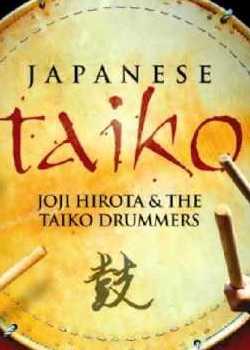Japanese Taiko

Performed by Joji Hirota & The London Taiko Drummers
ARC Music Release
28 April 2017
Review by Laurence Green
‘As in many other cultures, Japanese drums were used to communicate the people’s pleas to the gods, or in reverse, help people understand the will of the gods, and were considered invaluable instruments in everyday life.‘
Joji Hirota’s words set the scene for a world caught between two divides – people and gods, the sacred and the everyday, old and new. It is a world defined by this intoxicating mix, a soundscape for which this – his third album of taiko music – becomes a kind of experimental playground for exploring the range and flexibility of the instrument. Blending the essence of tradition with the inherent power of the taiko as a ‘performance art’, this CD serves as an excellent introduction to both the skill of Hirota and his players as musicians, but also a striking reminder of the warmth and richness of sound that can come from the taiko as an instrument.
For the uninitiated, the word ‘taiko’ is the Japanese for ‘big, fat drums’ – but they can in fact come in all shapes and sizes, from a modest 15cm diameter right up to a jaw-droppingly immense 140cm. Taiko music is rooted in the deep tradition of Kabuki and Noh theatre, as well as Buddhist and Shinto beliefs, and while this sense of taiko as a kind of ‘folk music’ persists, it has seen a surge of popularity in recent years as a dramatic, exciting performance art.
Musicians like Hirota have been at the forefront of this revolution, reinvigorating the instrument’s repertoire as part of concerted push abroad – introducing the taiko to a new, younger generation around the world. Enter the London Taiko Drummers – who accompany Hirota on this disc, and have been performing alongside him for over six years now. Indeed, for Hirota, this collaborative aspect is in many ways a key motivator behind the release of this CD, which he sees not only as a way of preserving their hard work, study and practice for posterity, but also as a stepping stone to even greater levels of skill in the future.
Going by the music displayed here, the years of discipline have definitely paid off. Hirota and his team capture a real depth of sound that, for all its natural percussiveness, never feels like it’s pounding its way into your head. Rather, the passion and energy of the players flows out across twelve individual pieces that come together to paint a complete picture – chapters in story that slowly unfurls the more you listen. One of the wonders of taiko music is that it operates on many distinct levels, offering hidden depths as you unpick the various elements that make up the ‘wholeness’ of the finished sound.
Much of the CD is rooted in the raw, elemental feel of nature, with tracks like ‘Haru no Ibuki’ (Spring Breeze) and ‘Chikyu’ (The Earth) surging with a powerful energy that really captures the sheer essence of natural life in its purest form. Hirota’s music has frequently featured in film and TV – including the Wildlife Survival documentary series as well as Martin Scorsese’s recent film ‘Silence’ – and the cinematic, widescreen feel of many of the tracks here is plain to see. Much like a director will carefully select and frame shots to best capture a feeling or emotion in a scene, so too does the pulse and flow of the taiko music here; one minute fast, another slow, all contributing to a highly organic feel that echoes the rhythms of the human body itself.
We are treated to a widening of the musical palette in ‘Kokiriko’, a charming harvest song from Ishikawa, Toyama prefecture, that slows the pace down to a rhythmic to-and-fro chant, accompanied by an elegant refrain played on the shakuhachi flute. Once again, the feelings of nature remain very much at the fore – a nostalgic feel of the passing seasons allowing a moment for pause and reflection amidst the more frenetic material elsewhere on the CD.
Special mention has to go to the accompanying booklet too, which serves as an excellent primer for the music; including an introduction from Hirota himself, biographies for all the players, translations of the track titles and lyrics, as well as an overview of other taiko and Japanese folk music releases from label ARC Music. The result is a package that, much like the music itself, is full-bodied and deep in flavour – one that rewards repeat listening and an appreciation for the finer details.
Throughout, the skill of both Hirota and The London Taiko Drummers is on ample display – for those new to taiko drumming, this CD makes for an excellent introduction, and for those more familiar with the instrument, the flexibility and richness of the material is sure to offer particular delight. Hirota’s personal manifesto centres around creating taiko music in a new contemporary style that also maintains the grace and high energy of the instrument’s traditional heritage, and based on the evidence here, we couldn’t agree more with his approach.

